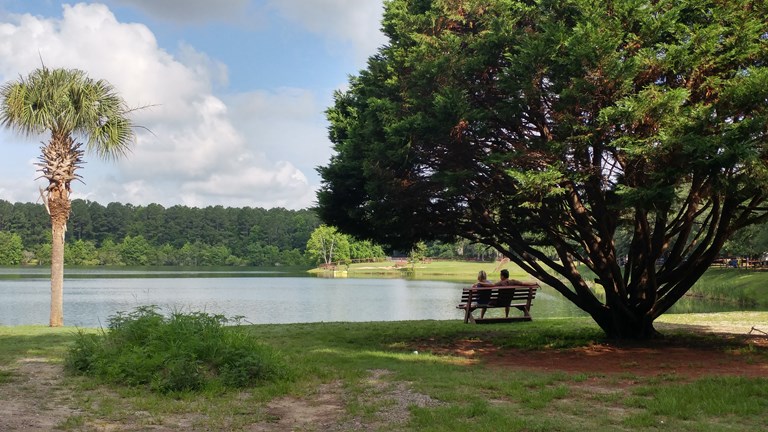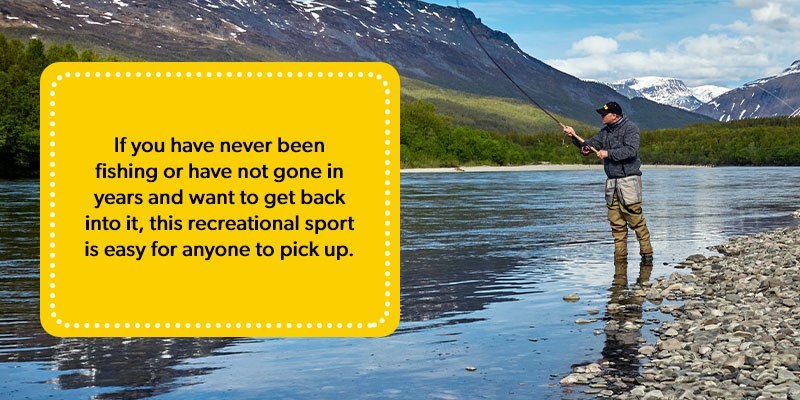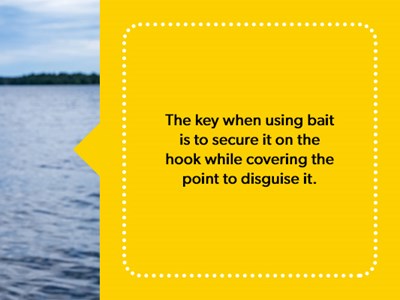Your cart is empty!
Make checkout easy by booking all your reservations at once. Add your sites from different campgrounds into your shopping cart* and then choose checkout.


Millions of people enjoy going fishing every year as it's a great way to enjoy the outdoors with friends and family or to get some alone time. If you have never been fishing or have not gone in years and want to get back into it, this recreational sport is easy for anyone to pick up. There are nearly endless locations and ways to fish across the country, giving you the opportunity to keep learning more about fishing even after nailing the basics.
With the right gear and basic techniques, you will be reeling in fish in no time. Start learning the basics with this guide to fishing for beginners!
As a beginner, you may think fishing is as easy as casting a line. While it certainly can be that easy, fishing has many different aspects, and knowing them can significantly enhance your success and experience on the water. Here are some important considerations when learning how to fish.
The first thing you need to go fishing is a fishing license for the state you will fish in. In many states, you can find both day licenses and annual licenses. If you plan to fish on more than one occasion, the annual license will likely be the more affordable option. Many states have exceptions for kids under certain ages, though you will want to check the regulations for the specific state or states you will fish in.
Getting your fishing license is critical to avoid fines and penalties as a legal angler. If a game warden catches you fishing without a valid license, you could face costly fines or even have your gear confiscated.
When learning how to go fishing, starting with good fishing etiquette is ideal so good habits form early. The best fishing etiquette involves respecting other fishers, the fish and the environment you're fishing in.
If you fish in a spot with other anglers, avoid crowding them, especially if they got there first. Always abide by catch limits, and only keep what you need if keeping the fish. Clean up after yourself and fish with leave-no-trace ethics in mind.
Having the right gear can make a huge difference in the success of your fishing trip. You pay for what you get when it comes to fishing rods and reels. Ultimately, if you buy the cheapest option, it may only last a few fishing trips and will be lower quality. As a beginner, opt for a rod-reel combo in the middle of the price range — think around $50. This gives you quality gear for your needs without breaking the bank or getting too fancy.
Other important gear includes monofilament fishing line, hooks, sinkers and bobbers. As a beginner, you will likely fish for panfish or bass, so tailor your gear to those size fish. Look for smaller hooks and sinkers to fashion a basic rig.

Once you have your line and hook rigged up, you need bait or lures to attract the fish. Worms and nightcrawlers are the most common choice for bait. Bits of hot dog, bread and corn kernels are good alternatives if you don't have worms, though they may not be as effective. The key when using bait is to secure it on the hook while covering the point to disguise it.
Fishing lures are essentially fake bait. They come in a variety of colors, shapes and sizes, all of which can affect your fishing. Fish can be attracted to many different colors, especially depending on the color of the water that day. Bright colors often work well in murkier water, and whites and pearls do well in clear water. You may have to change your lures around to find what the fish are after.
In terms of shape and size, choose something that will match the size of the fish's mouth. Play around with lures that appear to move in the water, as some fish like to chase.
One of the first steps to start fishing is casting your line. It varies, depending on your rod and reel, but these are the basic steps for a beginner:
If done correctly, your hook, bait and bobber should fly out into the water. If you've never cast a line before, it can be helpful to search a video and watch someone do it so you can mimic their actions.
Now you wait to get a bite. You may feel fish nibbling at your bait, though when you get a true bite, the fish will pull your bobber under the water. Set your hook in the fish's mouth by tipping the rod back, then begin reeling the fish in. If your line is taut, you have a fish on the line. Once you have reeled it in, carefully hold the fish from its belly to avoid any top fin spikes. To remove the hook, you can pull it out with your fingers, though you may need pliers for those tough-to-remove ones.
Depending on where you live, you may only have the choice of freshwater fishing, but you may be interested in saltwater fishing on a vacation or camping trip. While saltwater fishing can be exciting and offers the opportunity to catch some unique fish, freshwater fishing is best for beginners. Freshwater has a calmer atmosphere, letting you practice techniques you could take to saltwater after gaining experience.
Saltwater fishing also requires specific gear for saltwater use, which can get expensive. Until gaining more experience and learning fishing techniques, consider sticking to freshwater fishing. Many saltwater fishing destinations have fishing charters available if you want to learn the ropes from an experienced pro when the time comes.
Many kids and adults learn to fish for the first time when they go camping. What better way to learn how to fish than at the Kampgrounds of America? Mount Pleasant/Charleston KOA in South Carolina is near numerous local fishing areas, and you can enjoy catch-and-release fishing from the campground's 30-acre fishing lake. In addition to fishing, we offer a variety of other recreational activities around the campground.
Learn more about the Charleston KOA campground and look for rates and availability to book your trip and start fishing today!
That doesn't mean this area has to always be empty. When you start reviewing camping options, your history will display here to help compare sites and find the best stay. You will be able to share your stay information with friends or family and save it for a later time if you have a KOA Account.
Make checkout easy by booking all your reservations at once. Add your sites from different campgrounds into your shopping cart* and then choose checkout.